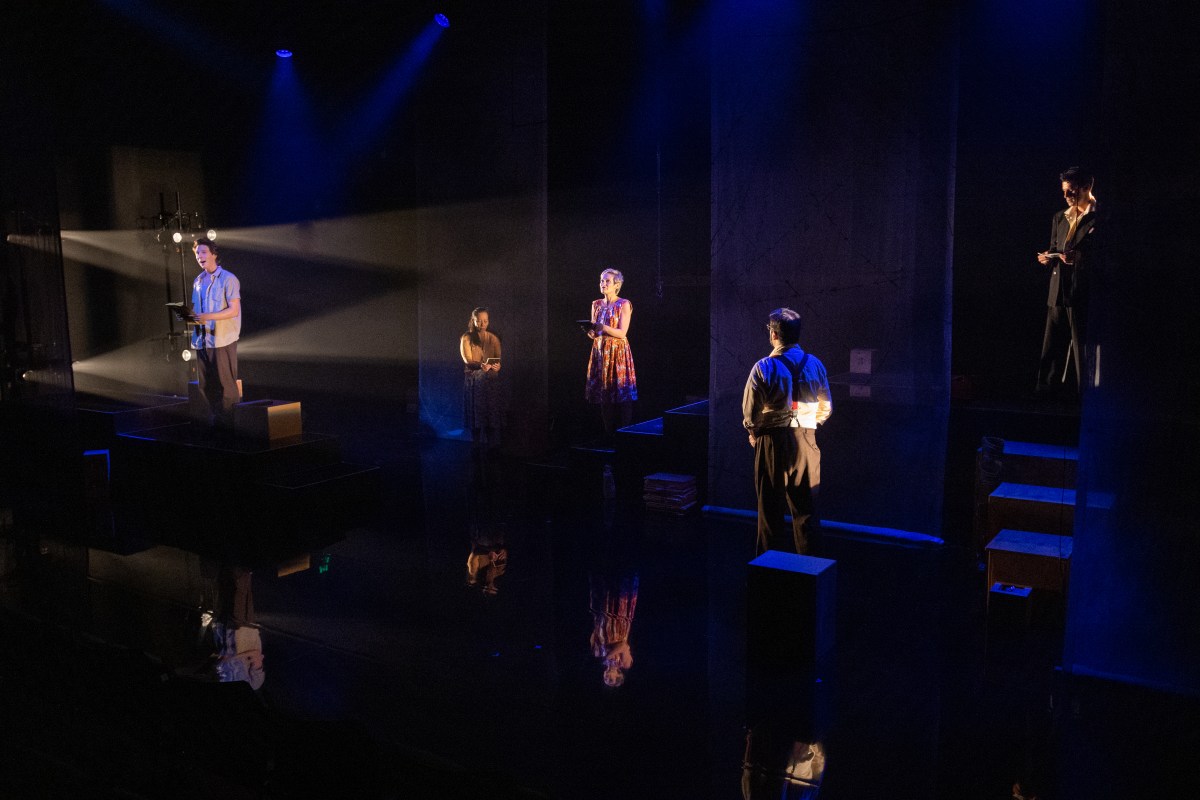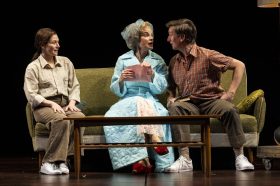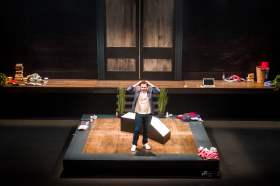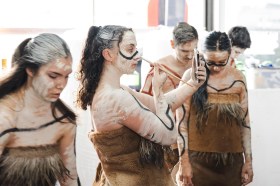Kristina Olsson’s Boy, Lost has been a long time in the making with a seven-year journey from the original concept of creating a stage play from the book. Co-Artistic Directors, Katherine Lyall-Watson and Caroline Dunphy, of independent theatre company Belloo Creative, recognised its potential, and approached Wesley Enoch, then Artistic Director of Queensland Theatre (QT) for assistance.
Enoch subsequently commissioned the play in 2015 and incoming QT Artistic Directors, Sam Strong and Lee Lewis, supported its ongoing development. COVID prevented the play from opening last year, but it has finally made it to the stage with a season of performances in the intimate Diane Cilento studio at Queensland Theatre.
Based on her own family history, Olsson’s story tells an all too familiar tale of family break-up and the effects on all involved, not least on the children. In this case there were particularly horrendous consequences for Olsson’s older brother Peter, who endured an almost unimaginably appalling childhood.
Boy, Lost is also a story very much about the Australia of the 1940s and 50s, with no birth control and children being institutionalised and taken away from their families, especially if, like Peter, they had a disability.
Covering a period of 60 years and centring predominantly on Peter’s story, Katherine Lyall-Watson’s development of the work into a stage play offers a detailed and fluid script. Flowing easily, if not always coherently, the play has five actors playing an assortment of roles to mostly good effect.
It is a difficult job to pack 60 years worth of dense information into a 95-minute show, so there are inevitable shortcuts, and these are not always effective.
Written in a non-linear time line, the play starts with Olsson’s parents, Yvonne and Michael, meeting in 1947 and moving to Cairns, when Yvonne is pregnant with Peter. It then jumps around between time scales – introduced fleetingly by the actors, which, certainly in the earlier scenes, is quite confusing.
The audience has to work hard to follow this progression, as they get to know the characters.
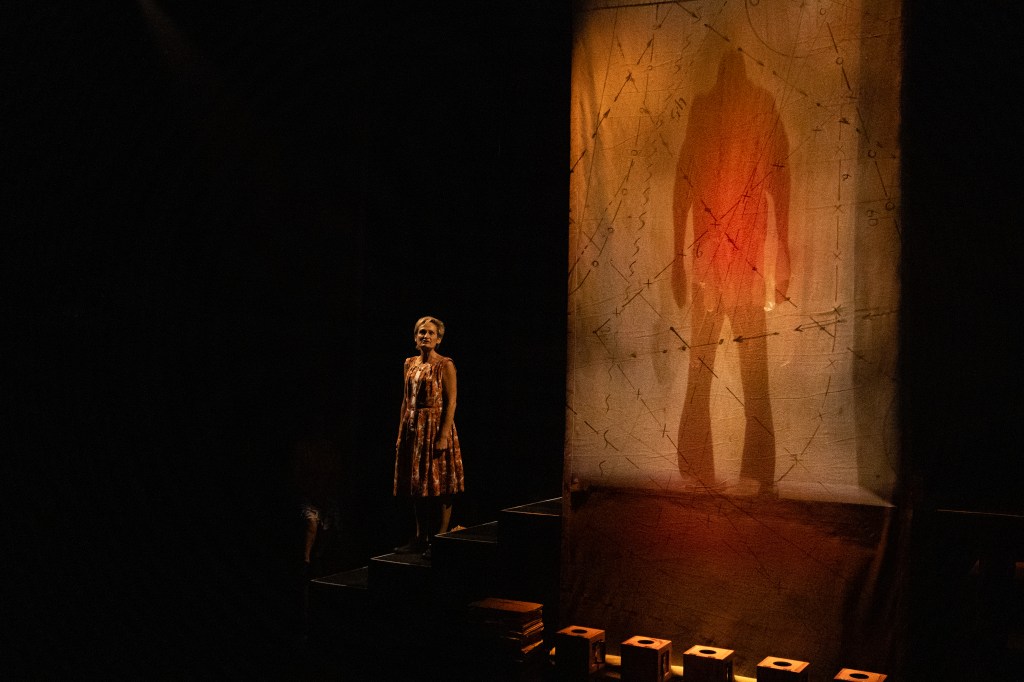
A critical piece of information, crucial to understanding the story, is surely to learn what happened to Peter as a young boy, and why he is no longer with his mother but stays with his father. This is not explained until the end of the play, and only obliquely then. It makes it difficult to comprehend why Yvonne has problems travelling on trains, for example. It feels as if this fact needs to be front and centre early on, as so much depends on it.
Dramaturgically, the writing also needs to be tighter and more focused. Some sections are overly repetitive, such as Peter’s many words about searching for his mother, and Yvonne’s mixed feelings about either searching for or leaving her lost son.
These thoughts are crucial to the story but need dramatically different communication methods. Yvonne’s mother tells her daughter several times, ‘You have made your own bed…’, which seems superfluous to the development of the storyline.
Director Caroline Dunphy uses the stage to good effect, creating well-positioned stage pictures within a basic set by Penny Challen, who also designed the range of period and modern costumes.
The small set has various levels denoting the many houses and scenes – enhanced by curtained screens depicting stylised inner rooms. The stage is quite beautifully lit by David Walters, bringing the scenes to life and realising both individual lighting states for each actor, as well as creating an excellent overall atmosphere for the entire work. The sound design by Guy Webster is also spot on.
Dunphy fleshes out her characters with much love and attention to detail, making them for the most part truthful and real. The dramatic scenes are generally well-managed, though the scenes behind curtains are not always as effective at creating the required emotive atmosphere. Some of the stylised acting scenes seem out of place here. One over-the-top scene, enacted by Michael, is embarrassing rather than amusing.
The play opens beautifully with the five actors introducing themselves and their roles. Then, moving at breakneck speed through a variety of scenes, it takes a while to settle into a more manageable rhythm. At this point it becomes more intelligible.
As Yvonne – Olsson’s mother – Hsiao-Ling Tang gives a finely nuanced performance throughout as a woman both torn and traumatised, but also finding love and coming to terms with her life. As her first husband, the chauvinistic wife- and child-beater Michael, Stephen Geronimos, is completely believable, giving an excellent rounded performance.
Zoë Houghton, the real-life daughter of Olsson, plays her real aunt Sharon – as a young girl, a teenager and an adult. She brings real passion and commitment to the role. Colin Smith takes on two main roles – Yvonne‘s overbearing mother in an apron (complete with a beard) and her gentle, Swedish second husband, Arne. Both are beautifully portrayed.
Read: Opera review: La Traviata
Morgan Francis plays Peter as a boy, adolescent and adult. He also composed the music and sings a few of the songs, quite hauntingly and with a pretty voice. He gives us a Peter who is strong and tenacious, very much on an even keel throughout the play, seemingly able to deal with the beatings, the sexual abuse, the neglect by the authorities and his disability with polio without being fazed.
The character gives us little sense of any trauma or neglect that he has suffered over many years, or of having to manage his disability. Clearly, he always wants to find his mother, but otherwise his suffering is left unexplored, which may be what the script requires, but it seems unrealistic.
Despite these various issues, Boy, Lost is a compelling and worthwhile play that deserves to be seen and heard. Not everything in this production works, and certainly it could do with some tweaking in the writing, dramaturgy and the telling of the story, but it has some lovely moving moments and is well acted by a committed cast.
Boy, Lost
Queensland Theatre, Brisbane
Belloo Creative
Original book: Kristina Olsson
Stage Play: Katherine Lyall-Watson
Director: Caroline Dunphy
Dramaturg: Kathryn Kelly
Lighting Designer: David Walters
Set and Costume Designer: Penny Challen
Sound Designer: Guy Webster
Composer: Morgan Francis
Cast: Colin Smith, Zoë Houghton, Hsiao-Ling Tang, Stephen Geronimos, Morgan Francis
Boy, Lost will be performed until 19 November 2022
